Sustainable real estate development has become increasingly important in today’s environmentally conscious world.
As more developers and investors recognize the value of eco-friendly practices, the demand for knowledge and resources in this field continues to grow. By exploring sustainable real estate development, you can gain valuable insights into creating properties that are both profitable and environmentally responsible.
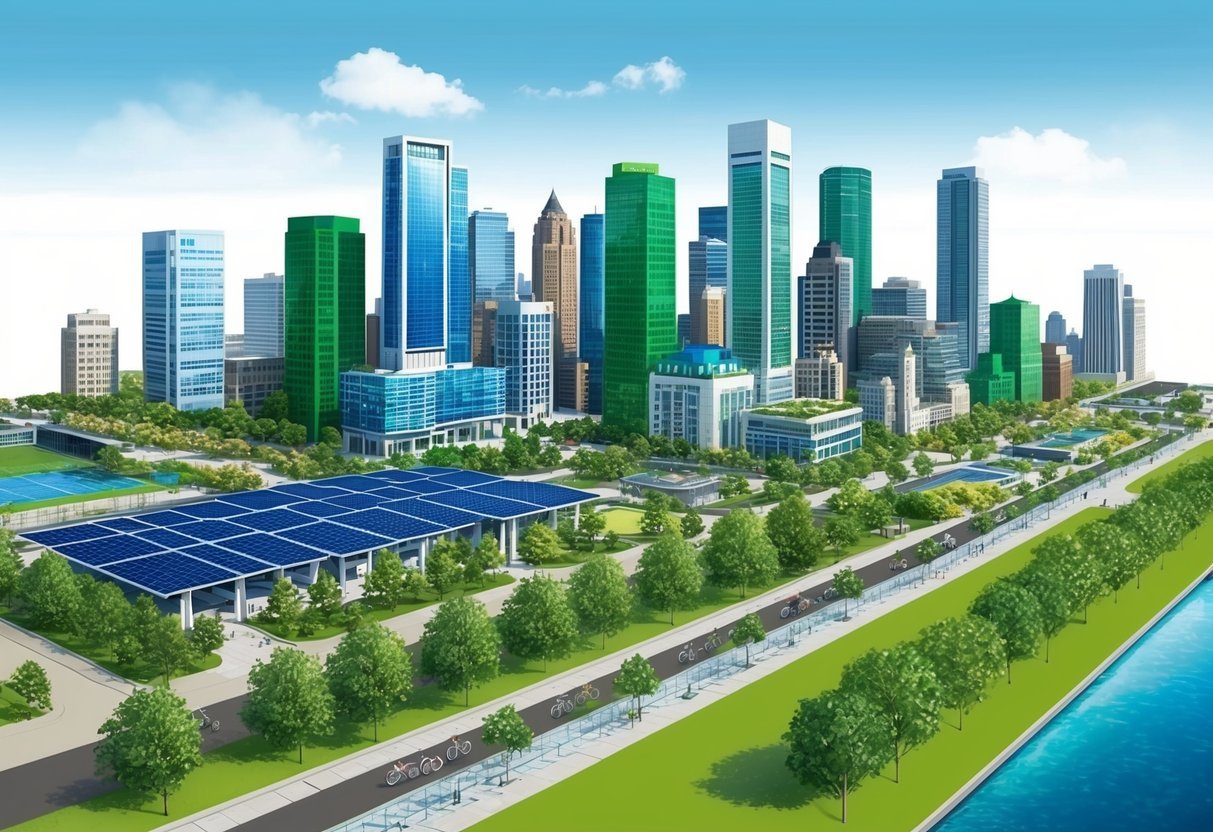
Learning about sustainable real estate practices can benefit you in numerous ways.
You’ll discover innovative techniques for reducing energy consumption, minimizing waste, and incorporating green building materials.
These skills can help you stay ahead of industry trends and position yourself as a forward-thinking professional in the real estate market.
1) LEED Certification Program
The LEED (Leadership in Energy and Environmental Design) certification program is a valuable resource for learning about sustainable real estate development.
You can explore this globally recognized green building rating system to gain insights into creating environmentally friendly properties.
LEED certification provides a framework for developing healthy, energy-efficient, and cost-effective green buildings.
By studying this program, you’ll learn about various sustainability aspects that can be incorporated into your real estate projects.
The certification covers multiple areas, including energy efficiency, water conservation, indoor air quality, and sustainable materials.
Understanding these elements will help you create properties that are not only eco-friendly but also attractive to environmentally conscious buyers and tenants.
LEED offers different rating systems for various project types.
For residential developments, you can focus on the LEED for Residential Design and Construction program.
This will teach you how to design homes that use less energy, consume fewer resources, and provide healthier living environments.
By pursuing LEED certification knowledge, you’ll gain a competitive edge in the real estate market.
Properties with LEED certification often command higher values and attract more interest from environmentally aware consumers.
The upcoming LEED v5 will introduce new concepts like long-term decarbonization pathways and 5-year capital plans.
Staying informed about these updates will keep you at the forefront of sustainable real estate development practices.
2) Green Building Advisor
Green Building Advisor is an invaluable resource for those interested in sustainable real estate development.
This comprehensive online platform offers a wealth of information to help you navigate the complexities of green building practices.
You’ll find expert advice, in-depth articles, and practical tips covering various aspects of sustainable construction and design.
The website’s extensive library includes guides on energy-efficient building techniques, renewable energy systems, and environmentally friendly materials.
Green Building Advisor also provides detailed product reviews and recommendations to help you make informed decisions about sustainable building components.
You can access case studies of successful green building projects, giving you real-world examples to learn from and inspire your own endeavors.
The platform features a community forum where you can connect with other professionals and enthusiasts in the field.
This allows you to ask questions, share experiences, and stay updated on the latest trends in sustainable real estate development.
To enhance your learning, Green Building Advisor offers webinars and online courses on various green building topics.
These educational resources can help you stay current with evolving industry standards and best practices.
By utilizing Green Building Advisor, you’ll gain access to a treasure trove of knowledge that can help you implement sustainable practices in your real estate projects.
This resource empowers you to make environmentally conscious decisions throughout the development process.
3) The Living Building Challenge
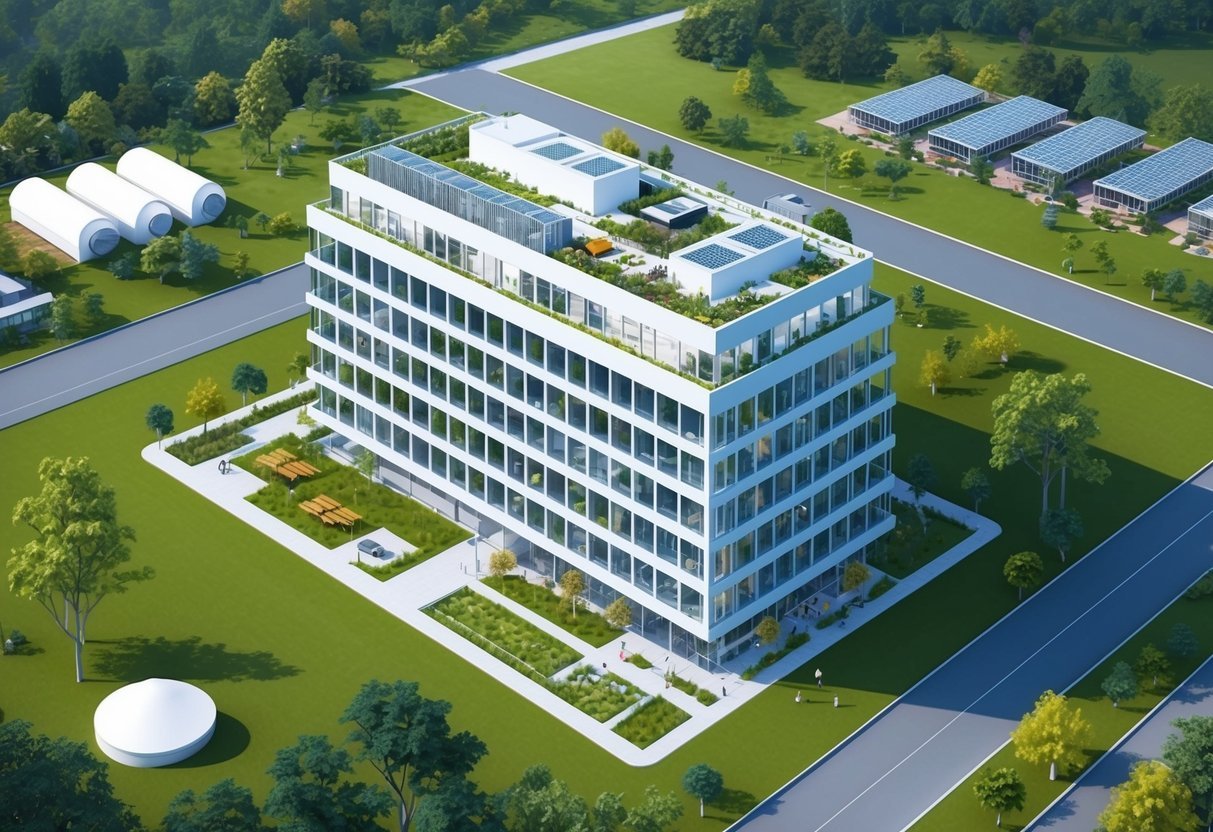
The Living Building Challenge offers a rigorous approach to sustainable real estate development.
This certification program, created by the International Living Future Institute, sets high standards for environmentally friendly construction.
You can use this challenge as a framework to create buildings that have a positive impact on their surroundings.
It encourages you to consider aspects like energy efficiency, water conservation, and the use of non-toxic materials.
When you aim for Living Building certification, you’ll need to meet strict criteria across seven performance areas.
These include energy, water, materials, health, equity, beauty, and place.
One unique aspect of this challenge is its focus on net-positive buildings.
This means your project should generate more energy than it uses and collect more water than it consumes.
The Living Building Challenge can help you create truly sustainable real estate projects.
By following its guidelines, you’ll develop properties that not only minimize environmental impact but actively contribute to ecosystem health.
Consider incorporating Living Building principles into your next development.
Even if full certification isn’t feasible, the challenge offers valuable insights for creating better built environments.
In New York City, achieving net-zero water usage can be particularly challenging for buildings connected to municipal systems.
However, striving towards these goals can significantly improve your project’s sustainability profile.
4) Passive House Institute
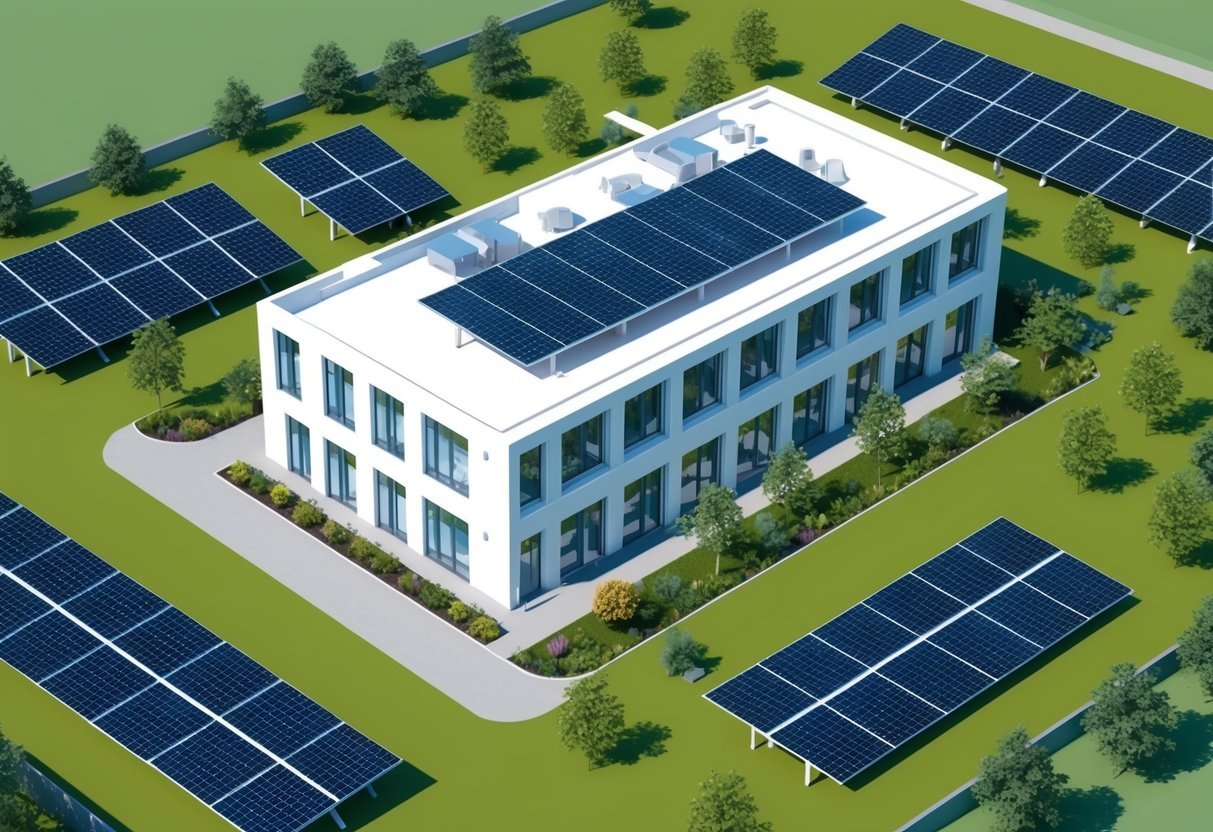
The Passive House Institute is an invaluable resource for real estate developers interested in sustainable construction.
Founded in 1996, this organization has been at the forefront of energy-efficient building design.
You’ll find a wealth of information on their website about the Passive House concept, which aims to create structures that require minimal energy for heating and cooling.
This approach can significantly reduce your development’s environmental impact and operating costs.
The institute offers comprehensive online training courses to help you understand the principles behind Passive House design.
These courses cover topics ranging from basic concepts to advanced technical details, making them suitable for both newcomers and experienced professionals.
By pursuing Passive House certification for your projects, you can demonstrate your commitment to sustainability and potentially increase your property’s market value.
The institute provides detailed guidelines and certification processes to ensure your developments meet the highest standards of energy efficiency.
Keep an eye out for the Passive House Award, which recognizes exemplary projects in energy-efficient construction.
Studying these award-winning developments can inspire your own sustainable real estate ventures and help you stay ahead of industry trends.
5) U.S. Green Building Council

The U.S. Green Building Council (USGBC) is an invaluable resource for anyone interested in sustainable real estate development.
As a real estate professional, you’ll benefit from their wealth of information on green building practices.
USGBC is best known for developing the LEED (Leadership in Energy and Environmental Design) rating system, a globally recognized standard for sustainable buildings.
By familiarizing yourself with LEED, you’ll gain insights into creating environmentally friendly properties that can attract eco-conscious buyers and tenants.
The organization’s website offers a treasure trove of educational materials.
You can access free articles, webinars, and case studies to enhance your knowledge of sustainable building techniques.
These resources can help you stay ahead of the curve in the evolving real estate market.
USGBC also provides information on upcoming LEED v5, which will focus more on operational greenhouse gas emissions.
This knowledge can be crucial for future-proofing your real estate projects and ensuring long-term sustainability.
By engaging with USGBC resources, you’ll be better equipped to advise clients on the benefits of green buildings.
These include improved energy efficiency, lower operating costs, and increased property value.
You’ll also be able to guide them through the LEED certification process if they choose to pursue it.
Understanding Sustainable Real Estate Development
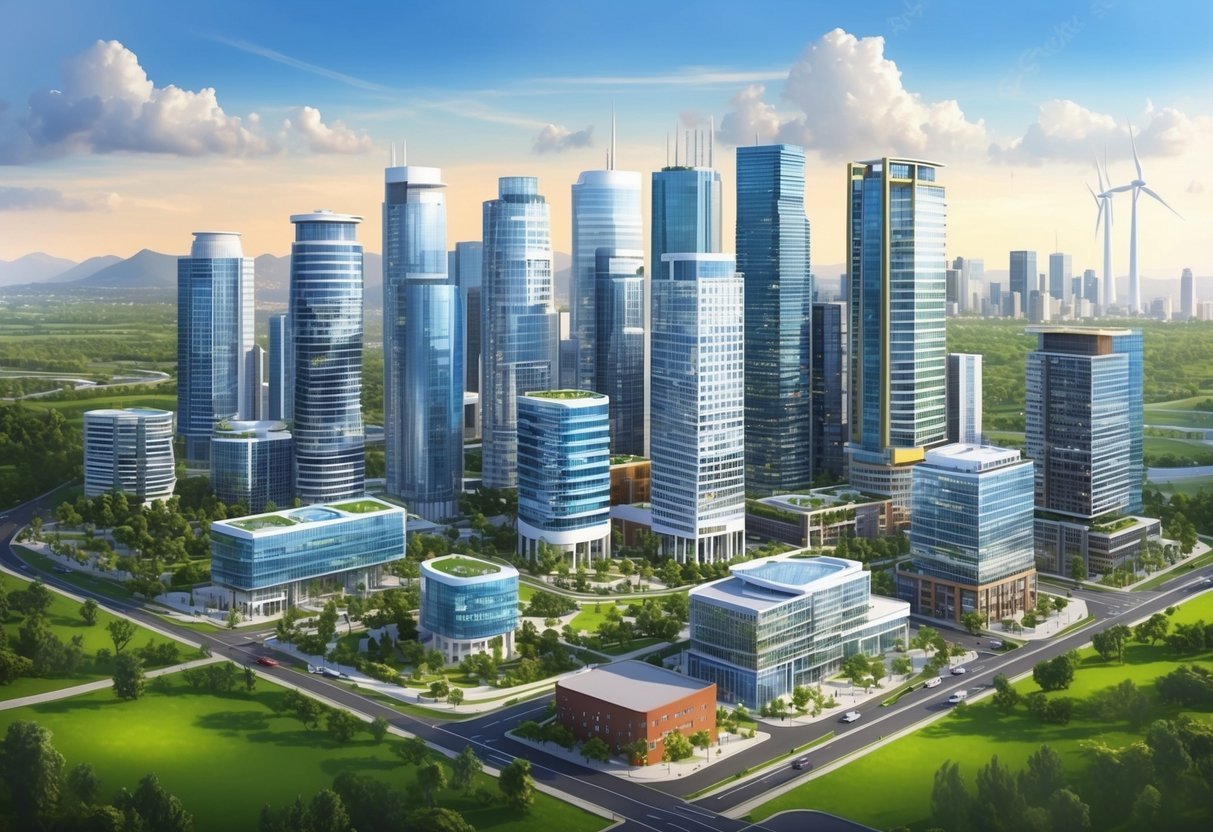
Sustainable real estate development integrates environmental responsibility with economic viability.
It aims to create buildings and communities that minimize negative impacts while maximizing long-term benefits for occupants and the surrounding ecosystem.
Core Principles of Sustainability
Sustainable real estate development focuses on energy efficiency, resource conservation, and occupant well-being.
You’ll find that green building practices often incorporate:
- Renewable energy systems like solar panels
- Water-saving fixtures and rainwater harvesting
- Environmentally friendly building materials
- Efficient HVAC systems and insulation
- Waste reduction and recycling programs
These principles extend beyond individual buildings to encompass entire communities.
Sustainable developments prioritize walkability, access to public transportation, and green spaces to reduce reliance on cars and promote healthier lifestyles.
Environmental Impact and Benefits
When you invest in sustainable real estate, you contribute to significant environmental benefits. Green buildings typically consume:
- 25-30% less energy
- 30-50% less water
This reduction in resource use translates to lower greenhouse gas emissions and a smaller carbon footprint.
Sustainable properties often feature improved indoor air quality, natural lighting, and biophilic design elements.
These factors can enhance occupant health, productivity, and satisfaction.
From a business perspective, sustainable real estate offers potential cost savings through reduced utility expenses and increased property values.
Many tenants and buyers now prioritize eco-friendly features, making sustainable properties more marketable and potentially more profitable in the long run.
Economic Implications of Sustainable Development
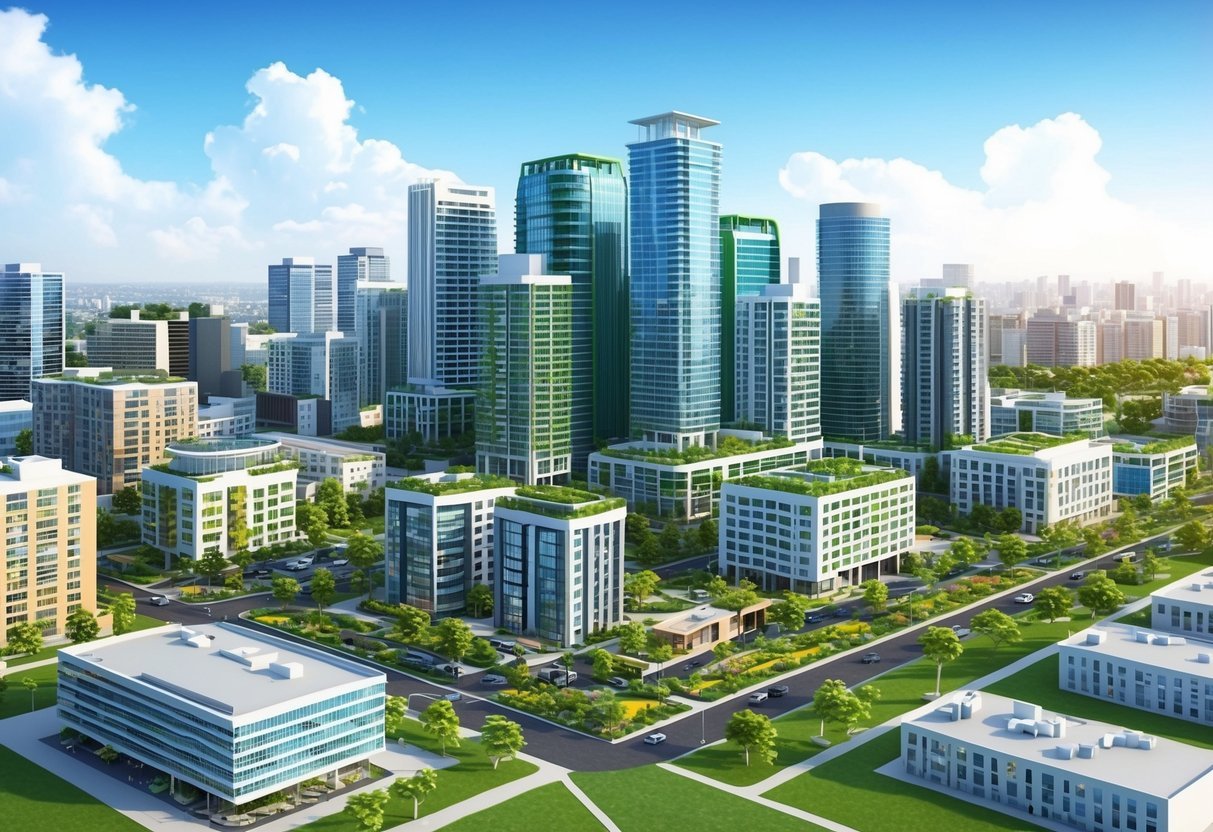
Sustainable real estate development offers significant economic advantages.
You can benefit from reduced operational costs and increased property values by implementing eco-friendly practices.
These strategies also align with evolving market demands and regulatory requirements.
Cost-Benefit Analysis
When evaluating sustainable real estate projects, you should conduct a thorough cost-benefit analysis.
Initial investments in green technologies may be higher, but they often lead to substantial savings over time. Energy-efficient systems can reduce utility expenses by 20-30%.
Water conservation measures cut down on water bills.
Waste reduction strategies lower disposal costs.
Consider these factors:
- Upfront costs vs. long-term savings
- Government incentives and tax breaks
- Potential for higher occupancy rates
- Reduced maintenance and replacement costs
By factoring in these elements, you can make informed decisions about sustainable investments in your real estate projects.
Long-Term Financial Returns
Sustainable real estate development can yield impressive long-term financial returns. Green buildings often command higher rents and sale prices, known as the “green premium.” This premium can range from 3-10% for certified sustainable properties.
Sustainable properties typically have:
- Lower vacancy rates
- Reduced risk of obsolescence
- Higher tenant satisfaction and retention
These factors contribute to increased property values over time.
Additionally, as regulations around energy efficiency and carbon emissions tighten, sustainable properties are better positioned to meet future requirements, potentially avoiding costly retrofits.
Key Legislation and Policies
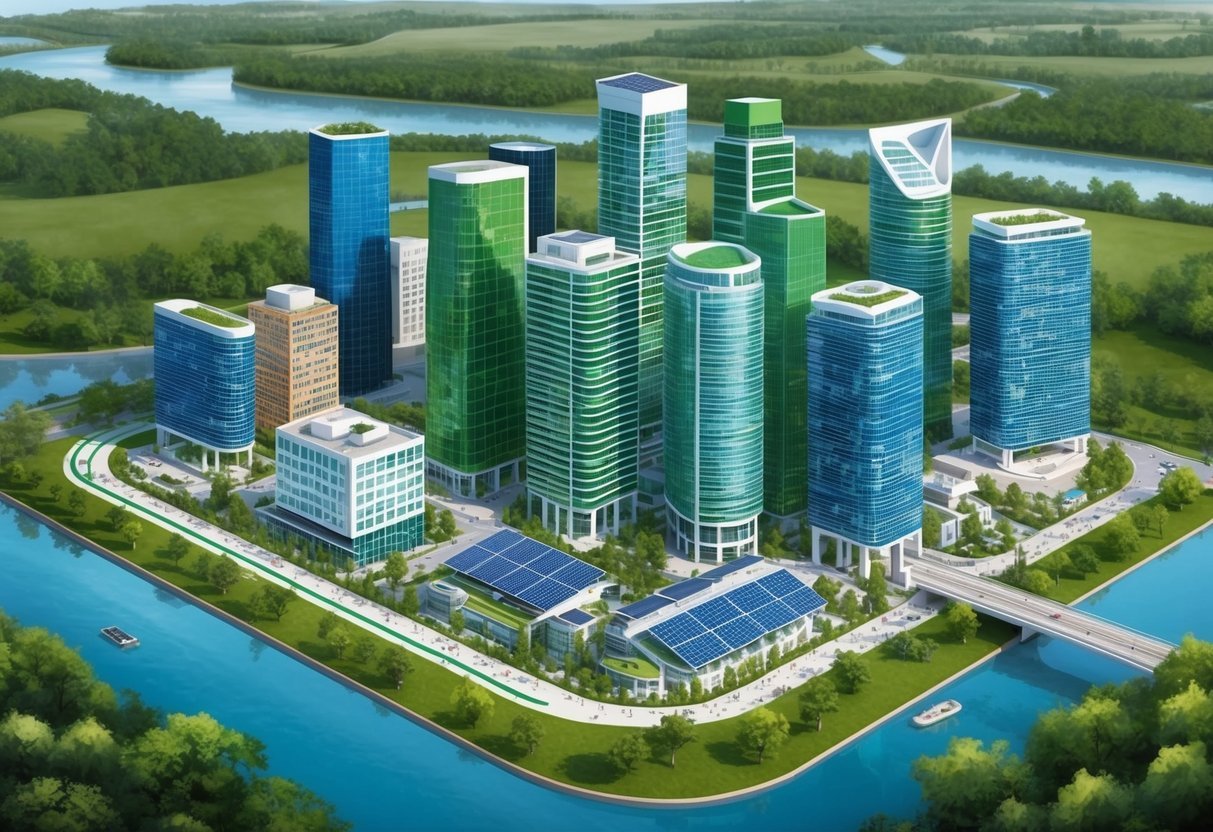
Sustainable real estate development is guided by various regulations and guidelines at both international and local levels.
These frameworks aim to promote environmentally responsible and socially conscious practices in the industry.
International Guidelines
The United Nations Sustainable Development Goals provide a global framework for sustainable real estate.
They emphasize the need for affordable housing, sustainable cities, and responsible consumption.
The Paris Climate Agreement also plays a crucial role.
It encourages real estate investors to integrate ESG and climate change risks into their decision-making processes.
You should familiarize yourself with these guidelines to align your projects with global sustainability standards.
Local Regulations
At the local level, regulations vary significantly.
Many cities now require energy efficiency certifications for new buildings.
Some impose strict environmental justice policies to address disparities in low-income communities.
Green building codes are becoming increasingly common.
These often mandate the use of sustainable materials and energy-efficient systems.
You should research specific regulations in your area, as they can significantly impact your development plans.
Consider consulting with local authorities or sustainability experts to ensure compliance.
Frequently Asked Questions

Sustainable real estate development involves complex strategies and evolving best practices.
Professionals seek to balance environmental responsibility with economic viability through innovative approaches and technologies.
What educational courses are available on sustainable real estate development?
You can find specialized courses on sustainable real estate at many universities and professional organizations.
The U.S. Green Building Council offers comprehensive educational programs on green building practices.
MIT’s Center for Real Estate provides an online course on sustainable real estate analysis and investment.
This program covers green building practices, technology’s role, and ESG principles in real estate.
How can professionals integrate sustainability into real estate development projects?
Integrating sustainability starts with setting clear goals and metrics for your project.
You can implement energy-efficient systems, use sustainable materials, and design for optimal resource utilization.
Consider incorporating smart technologies to track consumption and improve efficiency. Real estate executives are prioritizing IoT devices for sustainability initiatives in 2024.
Which online platforms offer certifications in sustainable real estate practices?
LEED Certification Program is a widely recognized platform for sustainable building practices.
The Passive House Institute offers certifications for ultra-low energy buildings.
Green Building Advisor provides resources and certifications for professionals seeking to enhance their sustainable building knowledge.
What are the best practices for ensuring sustainability in urban development?
Focus on transit-oriented development to reduce reliance on personal vehicles.
Implement green infrastructure like bioswales and green roofs to manage stormwater and reduce urban heat island effects.
Prioritize mixed-use developments to create walkable communities and reduce transportation needs.
Incorporate renewable energy systems and energy-efficient building designs.
What are the latest trends in sustainable real estate development?
Net-zero energy buildings are gaining traction, aiming to produce as much energy as they consume.
Biophilic design, which integrates nature into built environments, is becoming increasingly popular.
How is technology influencing sustainable practices in real estate?
Building Information Modeling (BIM) is revolutionizing sustainable design.
BIM allows for precise energy modeling and optimization.
Smart building systems are enabling real-time monitoring and adjustment of energy consumption.
3D printing technology is being explored for sustainable construction.
It has the potential to reduce waste and transportation emissions.
Artificial intelligence is enhancing predictive maintenance, improving building efficiency and longevity.

